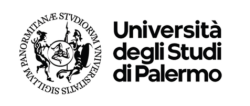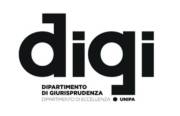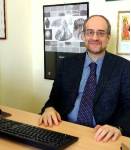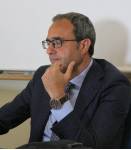Climate Justice Living Lab
 |
|
 |
Titolo del Progetto:
CLIMATE JUSTICE LIVING LAB – CJLL
N° 2023-1-IT02-KA220-HED-000161993
Programma Erasmus+ KA220-HED - Cooperation partnerships in higher education
Start: 01/09/2023 - End: 31/08/2026
Sezione website:
Webpage: under construction
Mission:
La dimensione e l'urgenza dell'emergenza climatica richiedono che tutti i settori della società si mobilitino per attuare rapidamente una transizione radicale e giusta per affrontare gli impatti climatici antropici. In questo contesto, il diritto rappresenta uno strumento essenziale per il cambiamento strutturale a tutti i livelli e una formazione universitaria di qualità gioca un ruolo chiave nel garantire che gli attuali e futuri professionisti del diritto, i giornalisti e gli attivisti climatici abbiano competenze specifiche e siano dunque in grado di essere protagonisti consapevoli della promozione della giustizia climatica nei rispettivi campi di attività. Il progetto CJLL mira a sviluppare e diffondere curricula didattici innovativi nel campo del diritto dell’ambiente e della giustizia climatica che, formulati sulla base delle reali esigenze del settore, fornirà competenze aggiornate, transdisciplinari, teoriche, pratiche e strategiche, fondamentali per costruire professionalità adeguate alle esigenze del mercato del lavoro ed in grado di essere attori del cambiamento climatico. CJLL, inoltre, istituirà il primo living lab in Europa incentrato specificamente sul diritto dell’ambiente e sulla giustizia climatica, che, con le sue attività collaborative (ad esempio webtalk e gruppi di lavoro) rappresenterà una piattaforma innovativa e partecipativa per rafforzare la cooperazione tra portatori di interessi e professionisti del settore.
Project Brief:
The scale and urgency of the climate emergency demand mobilization across all sectors of society to swiftly implement a radical and just transition to address anthropogenic climate impacts. In this context, law serves as a crucial tool for structural change at all levels, and quality university education plays a key role in ensuring that current and future legal professionals, journalists, and climate activists possess specific skills, enabling them to be conscious advocates for climate justice in their respective fields. The CJLL project aims to develop and disseminate innovative educational curricula in the fields of environmental law and climate justice. Formulated based on the real needs of the sector, these curricula will provide updated, transdisciplinary, theoretical, practical, and strategic competencies essential for building professionalism that meets the demands of the job market and enables individuals to be agents of climate change. Additionally, CJLL will establish the first living lab in Europe specifically focused on environmental law and climate justice. Through collaborative activities such as web talks and working groups, it will serve as an innovative and participatory platform to enhance cooperation among stakeholders and industry professionals.
Obiettivi principali del progetto:
- Rafforzare il ruolo dell’educazione universitaria nella gestione delle sfide sociali connesse al cambiamento climatico. In particolare, il progetto in questione intende rafforzare la cooperazione tra il mondo dell’università, quello del lavoro e quello dell’associazionismo predisponendo programmi di apprendimento transdisciplinari.
- Formare e sensibilizzare le nuove generazioni, gli operatori del diritto, i responsabili delle comunicazioni di massa e gli attivisti ambientali sulle principali questioni politico-sociali collegate ai cambiamenti climatici (scarsità di risorse, migrazioni, conflitti armati) e sulle nuove frontiere del diritto ambientale nell’ottica della giustizia climatica.
- Creare nuovi curricula didattici rivolti a professionisti del diritto, studenti, attivisti e giornalisti che prenderanno spunto da una valutazione dei bisogni reali degli operatori attualmente attivi nel settore della giustizia climatica, rendendo le conoscenze e le competenze apprese (sia scientifiche, sia giuridiche) immediatamente spendibili nel mercato del lavoro. Nell'ambito dei curricula didattici, inoltre, non mancheranno interessanti opportunità per consentire ai partecipanti di mettersi alla prova, costruendo e/o rafforzando la propria preparazione per divenire attori consapevoli di giustizia climatica.
- Migliorare la qualità dell'insegnamento, dei materiali didattici e delle attività di apprendimento grazie allo scambio di metodologie didattiche e buone pratiche tra i diversi partner e l’università.
- Attivare percorsi di apprendimento flessibili (nella forma di summer school e winter school) da svolgersi presso l’Università di Palermo e presso le università partner.
- Creare una piattaforma digitale (living lab) per la raccolta e lo scambio dei dati scientifici e giuridici riguardanti i cambiamenti climatici e le politiche pubbliche ambientali, che ospiterà, tra l’altro, video pills e web talks.
- Elaborare un manuale teorico-pratico sul diritto climatico per destinato a tutti coloro che intendano approcciarsi alla questione della giustizia climatica.
Main Project Objectives:
- Strengthen the role of university education in addressing social challenges related to climate change. Specifically, the project aims to enhance collaboration between the academic, professional, and associative worlds by developing transdisciplinary learning programs.
- Educate and raise awareness among new generations, legal professionals, mass communication specialists, and environmental activists on key socio-political issues linked to climate change (resource scarcity, migration, armed conflicts) and the new frontiers of environmental law from a climate justice perspective.
- Develop new educational curricula for legal professionals, students, activists, and journalists, inspired by an assessment of the real needs of practitioners in the climate justice sector. These curricula will make acquired knowledge and skills (both scientific and legal) immediately applicable in the job market. Additionally, the curricula will provide opportunities for participants to test themselves, building or strengthening their readiness to become informed agents of climate justice.
- Enhance the quality of teaching, educational materials, and learning activities through the exchange of teaching methodologies and best practices among different partners and universities.
- Implement flexible learning pathways (in the form of summer schools and winter schools) to be conducted at the University of Palermo and partner universities.
- Establish a digital platform (living lab) for the collection and exchange of scientific and legal data on climate change and environmental public policies. The platform will host, among other things, video pills and web talks.
- Develop a theoretical-practical manual on climate law for anyone seeking to engage with the issue of climate justice.
Project Team:
Leader:
Università degli Studi di Palermo
projectcjll@unipa.it
|
|
 |
||
|
Prof. Nicola Gullo - Project Coordinator Prof. Nicola Gullo is professor of administrative law at the Department of law of University of Palermo. He is specialised in the protection of natural ecosystems and natural resources and teaches environmental law in the departments of law, natural sciences, and environmental engineering. He also gives lectures in numerous other Universities on environmental law and has received, over the years, several consultancy assignments by public bodies at both national and regional level. He is member of the Scientific Council of the centre for sustainability and ecological transition of the University of Palermo and the scientific director and coordinator of the second level specializing master course on “law and technique of ecological transition” activated by the departments of law and engineering of the University of Palermo. |
 |
||
|
Dr. Giulia Torta is research fellow at the Department of law of University of Palermo. She has a PhD in Human Rights: evolution, protection and limits at the University of Palermo and her research activity is focused on the fields of administrative law and environmental law. From Aug 2019 to Oct 2020, she was Postdoc researcher at the University of Paranà (Brasil) where she researched on the topic of the protection of water. She gives lectures on environmental law both at the University of Palermo (Departments of law, natural sciences, and environmental engineering) and at other Universities. |
 |
||
|
Marica Di Pierri is a research fellow at the University of Palermo on Climate Justice, a research topic on which she obtained her PHD in Human Rights at the same university.
|
 |
||
|
Prof. Maurizio Cellura is professor of environmental physics at the Department of engineering of the University of Palermo. He is specialised in the evaluation of environmental impacts and life cycle assessment. He teaches building physics, energy efficiency and eco-design of systems and processes, and sustainable energy solutions for buildings at the Department of environmental engineering and he also gives lectures in numerous other Universities. Over the years, he has received several consultancy assignments by public bodies at both national and regional level. He is the director of the centre for sustainability and ecological transition of the University of Palermo. |
 |
- Riunione generale con Agenzia Indire (10 ottobre 2023)
- Kick-off meeting (30-31 ottobre 2023)
- Seminario "La tutela dell'ambiente marino e costiero nella prospettiva dei cambiamenti climatici" (27 marzo 2024)
- Meeting with Symbiosis Law School, Pune - India (26 marzo 2024)
- Summer School "Democracy and Climate Justice" (1-6 luglio 2024): The Summer School, which will last six days, serves as an opportunity for in-depth exploration and debate on four topics of crucial importance in the current global context: the science of climate change, ecological transition, the sources of climate rights, and trends in climate jurisprudence. The interdisciplinary approach adopted during the Summer School will allow for the analysis of the climate change issue from various perspectives, integrating scientific, political, legal, and social knowledge. Through seminars conducted by experts, participants will have the opportunity to gain a broader and deeper understanding of the factors contributing to climate change and possible solutions to effectively address it. Moreover, during the final two days of the Summer School, special space will be reserved to facilitate active participant engagement. Indeed, PhD students will have the opportunity to present their ideas and research through a dedicated call for abstracts on the theme of democracy and climate justice. This will enable them to share their perspectives and actively contribute to the academic debate on this crucial topic.
- Seminario "Cambiamenti climatici e nuove prospettive del diritto pubblico. La tutela dell'ambiente tra diritto penale e diritto amministrativo" (27 settembre 2024)
- Seminario inaugurale del master DITTEC su "Cambiamenti climatici, crisi ambientale e poteri pubblici. Presentazione del libro di Francesco de Leonardis, Lo Stato ecologico" (25 ottobre 2024)
- Il "principio fondamentale ambientalista": possibili configurazioni e propsettive evolutive (21 marzo 2025)
- Principio di sostenibilità e nuove prospettive della giustizia climatica (22 marzo 2025)
- Convegno "Il governo del mare" (11 aprile 2025)
Output:
- Training curriculum
- Handbook
- Living Lab - https://cjll.eu/







